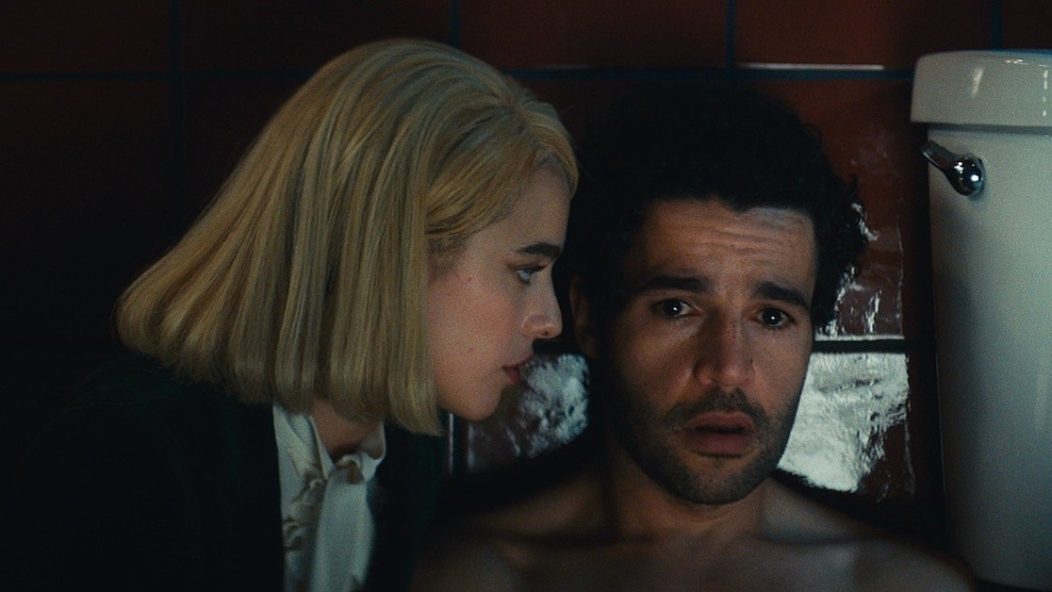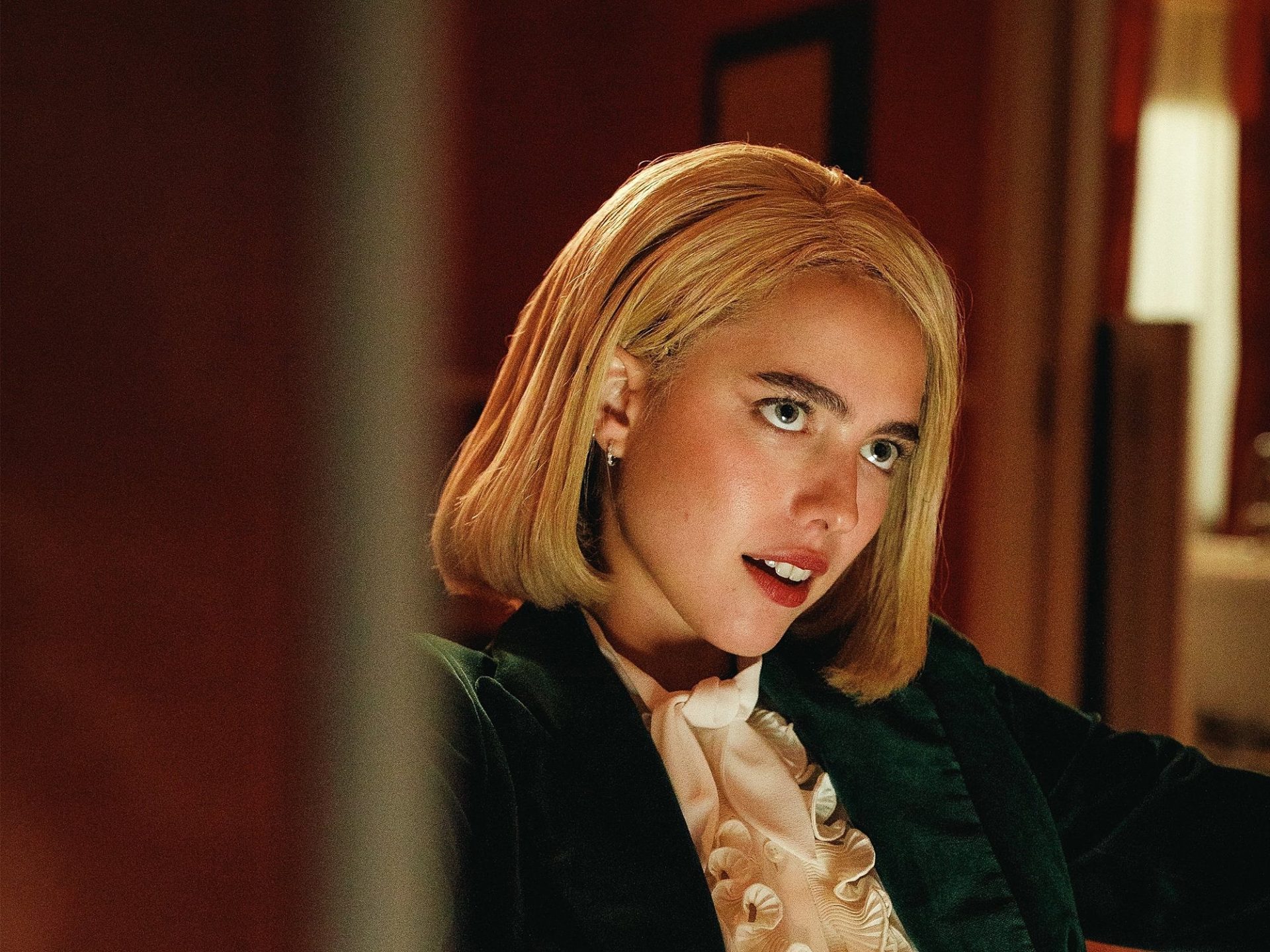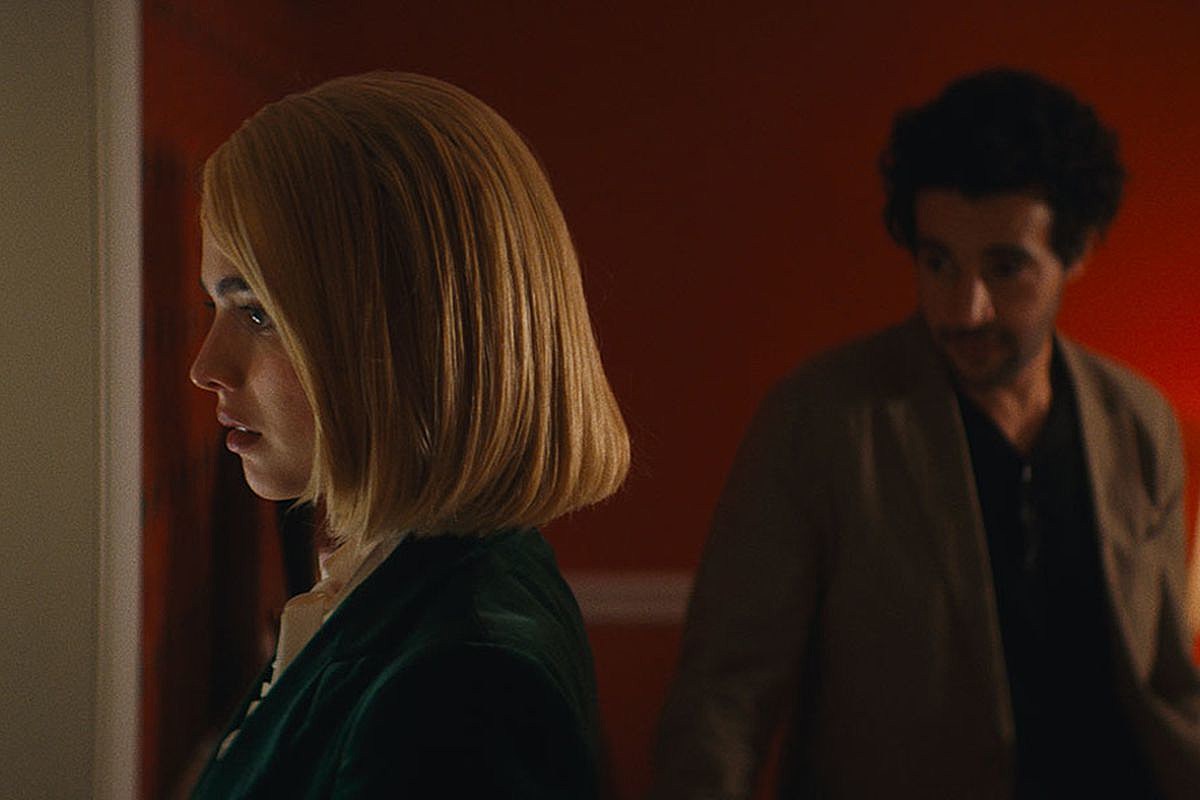
How BDSM & paradoxes inspired director Zachary Wigon to make his new erotic thriller Sanctuary
The erotic thriller has seen a rocky resurgence over the past few years, with movies and television shows trying and sometimes failing to reach the heights of their ‘80s and ‘90s predecessors. However, if there’s any new release that comes close to achieving the lofty expectations set by films like Fatal Attraction and Single White Female, it’s Sanctuary.
The movie, which hits select theaters today before its wide release May 25, follows a simple boy-meets-girl premise with an enticing twist. Set almost entirely in one room, down-on-her-luck dominatrix Rebecca (Margaret Qualley) and wealthy submissive Hal (Christopher Abbott) explore the complicated dynamics at play with their erotic games throughout one fateful session. Showcasing the best performances of their careers, Qualley and Abbott both arouse and disturb in equal measures as two people hurtling towards the brink of collapse.
Overseeing their intertwined collapses is director Zachary Wigon, who proved to be a new voice for romantic thrillers with 2014’s The Heart Machine. Now, thanks to a fascinating directorial approach and a sharp screenplay from Micah Bloomberg, Sanctuary further solidifies that voice.
Alternative Press spoke with Wigon about making a film centered around BDSM, his love for rom-coms and erotic thrillers, and more.
Read more: The Matrix sequels at 20: How the Wachowskis subverted expectations to make an inventive trilogy

[Courtesy of NEON]
You don’t really see a ton of movies that dive into this subject matter. What exactly was it that drove you to create this film? What was the genesis of it?
I had been interested in the idea of making a movie about a dominatrix for a while. It was really this simple, core bit that connects to a longer thing that I have about how movie structure works. I think that movie structure tends to be really effective when movies are built around paradoxes, and I felt like the job of a dominatrix presented an interesting paradox because the dominatrix simultaneously has all of the power over her client, and also none of the power over her client. When you start to explore that gap between these two poles of the paradox, it’s always really interesting.
So, my friend Micah Bloomberg, who wrote the screenplay, he and I were on the phone in June 2020, and he was saying that he wanted to write some scenes and he was like, “Let’s develop a movie. I’ll write it, you’ll direct it,” and I said, “Great.” I pitched him this very, very vague idea at the time about a dominatrix who robs her wealthiest client — that was the thinking at that time. Then Micah mentions that many years earlier, he had written a one-act play about a dominatrix and a client set in a hotel room. So we were both like, “Oh, we’ve both circled a similar idea,” and we settled on that and went from there working it out.
What were the challenges that you encountered when trying to take that idea from something that was meant for the stage and put it on the screen?
It’s actually not an adaptation. Micah had been interested in something in that universe, and that was sort of where I think that play kicked in for him, but we weren’t working to adapt the play. It was an original story that Micah wrote.
But to speak to the specific challenges, because it is a theatrical setup — it’s two people in one location over 96 minutes — there were significant cinematic and visual challenges. That was one of the most interesting aspects of this for me personally. As a director, you always want things to feel visually fresh, dynamic, exciting. You want to be constantly stimulating the audience with new visual ideas, and it’s very difficult to do that when you’re in one space. That challenge was really exciting to me.
The specifics of the challenge were basically, “How do you keep the images, the frames, the blocking, the composition, all of those visual elements feeling fresh when you’re in the same space for all this time?” That came down to making sure that the blocking was always changing, that I was never going back to shots that I had used earlier in the movie. It was really important to me that the actors actually never repeat blocking positions over the course of the film, and the camera position and the frame composition also never repeat.

Something very interesting with the film is the nuances that are involved in their BDSM relationship — how one character can have all the power in one part of the relationship and another has power in another, specifically in the class and social dynamics. How did you go about trying to capture the intricacies of BDSM?
I think it was less about being necessarily like a docu-drama portrait of all the nuances of BDSM, and more about being a docu-drama portrait of the nuances of the relationship between these two specific characters. When I was reading the pages that Micah was turning in, the characters had such depth, and the relationship between them had such depth and such intricacy on the page.
It always felt true in terms of what the relationship is like between these two people, and the way that the fantasy aspect of their relationship and the real-life aspects of their relationship were in constant conflict with one another. That was the lens that I was really thinking about the story through. Once we understand who Rebecca is as a character and what’s important to her, and once we understand who Hal is as a character and what’s important to him — is everything that follows true to that psychology that we’ve established? Are we playing fair with what we know about these characters?
It was always, for me, a deep dive character study into, as you said, the nuances and the specifics of what makes each of these people tick. What was central to that is this idea of roleplay and fantasy and the idea that in the roleplay and fantasy space, sometimes you can find a truer version of yourself than the version of yourself that exists in reality. It’s another paradox.
It’s really surprising how funny Sanctuary is. Was embedding the film with humor an intentional tonal decision or was it something that came up naturally within the pre-planning and filming process?
It was an intentional decision. One of the things that is great about working with Micah is he’s exceptionally funny. It’s almost like it’s this added bonus that you’re gonna get working with him, where I knew that we would have this kind of secret weapon, which was the comedy inside everything else that was going on.
As long as everything else in the story is true and interesting, realistic to the setup, I don’t think you can ever go wrong with also having humor. As long as the humor is not undercutting the significance of the story, but it’s existing alongside it, then I think you just get an extra layer of richness and depth to the story that you’re telling. Because life is often funny in situations where you wouldn’t expect it to be funny, right?
The way that humor aligns inside so many situations that are not funny at all is interesting to me. And I guess we have the opportunity to do that here.
With that in mind, would you consider this a rom-com?
It’s funny, I guess my approach to genre is I think that genre is helpful for understanding certain rules about storytelling and certain things in the contract between the storyteller and the audience. But with this movie, I don’t know. If other people want to label it that way, that’s perfectly fine by me, but for me, I wouldn’t want to put a box around it that other people would only see it through that way.
I love the old screwball comedies. I love His Girl Friday, I love Bringing Up Baby, and I think it’s really interesting how often in those movies, people treat each other kind of objectively horribly, you know? Like, it’s always played for laughs, but they often do terrible things to one another. And in the psychological, erotic thriller genre, often those movies can be funny in ways that are unexpected. So, I guess there’s this connective tissue between those genres and that was maybe what I was interested in sticking out here, genre-wise.
This interview was edited and condensed for clarity.







